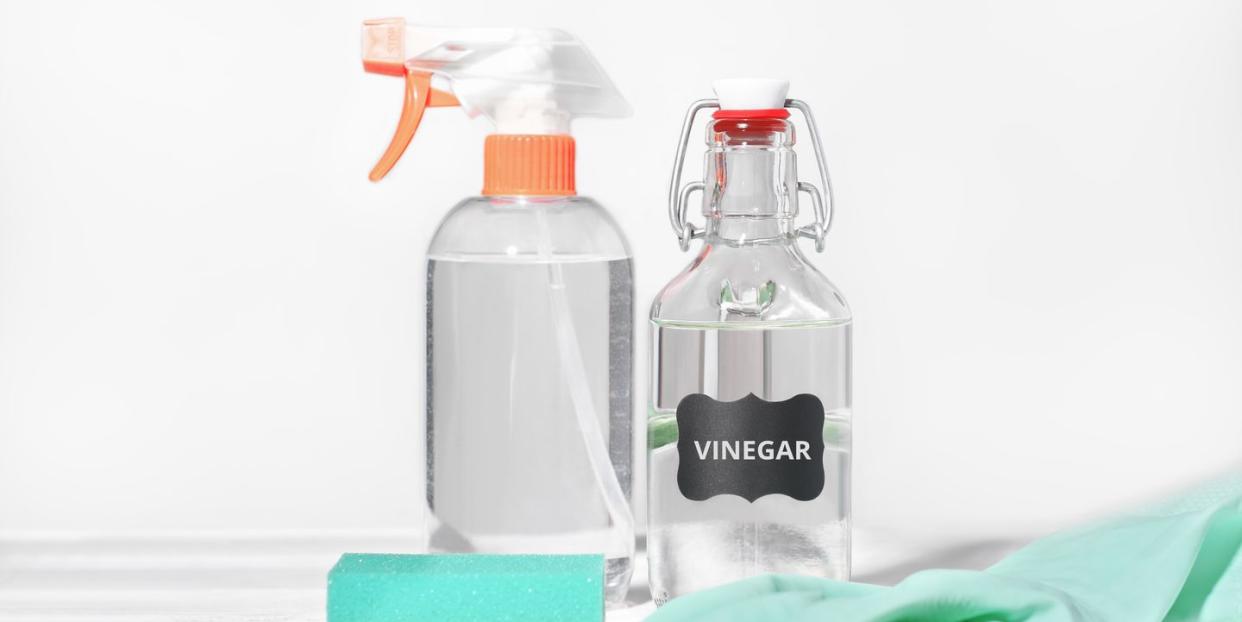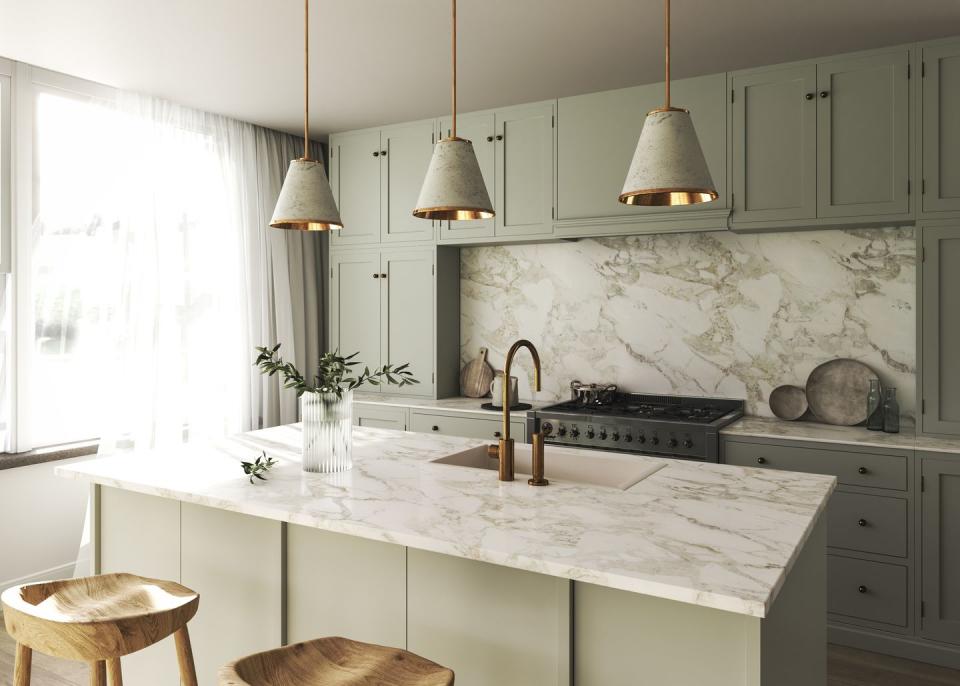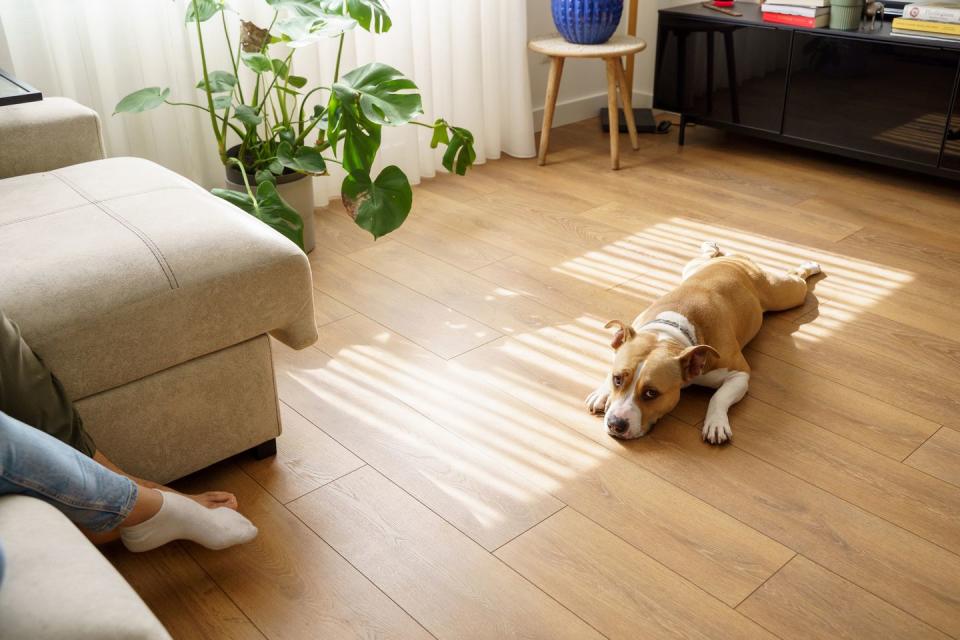7 things you shouldn't clean with vinegar

Distilled white vinegar is a popular cleaner, and for good reason; it's affordable, effective and versatile, allowing you to cut down on the number of chemicals you use in your home. Its acidity can dissolve and break down stains, making them that much easier to shift, and its uses don't stop there. It’s also an effective limescale remover, window cleaner and kettle descaler. When combined with bicarbonate of soda, the chemical reaction comes in useful for keeping drains and plugholes draining smoothly, too, providing you use it regularly.
However, vinegar is not suitable for use on every surface. In fact, it’s strong enough to do damage in certain cases. We’ve rounded up seven surfaces you should steer clear of using vinegar on, and suggested what to use instead.
1. Natural stone surfaces
Natural stone surfaces, including the likes of marble, limestone and granite, are a no-go when cleaning with vinegar, as the acid can eat away at the surface and lead to damage.
Stick to using cleaners recommended by the supplier of the surface to avoid damage; Method Granite & Marble Surface Cleaner is just one example of a specialist cleaner that might fit the bill. Once clean, rinse and then buff dry.

2. Rubber
Vinegar will degrade rubber on contact. That means you shouldn’t apply it directly to the rubber door seal of your dishwasher or washing machine. Use a damp microfibre cloth and a suitable cleaner, such as Liqui Moly 1538 Rubber Treatment instead. If you want to prevent mould from building up on your washing machine seal, you can wipe it over with a solution of diluted bleach, but it needs to be fully dry before your next wash to avoid bleaching the load.
However, vinegar can be used to clean the inside of your dishwasher (it will be diluted enough during the cleaning cycle that it shouldn't damage the door seal) but always check the user manual or manufacturer's guidance first. For instructions on how to do this, check our how to deep-clean a dishwasher guide. Otherwise, there are proprietary cleaners available for both dishwashers and washing machines, such as Finish Dishwasher Deep Cleaner and Dr. Beckmann Service-it Deep Clean Washing Machine Cleaner.
NOTE: Never combine vinegar with bleach; it creates a lethal chlorine gas.
3. Kitchen knives
Vinegar might appear to be the solution to rusty knives, but the acidity can take its toll on the blade and degrade it over time. It’s not an ideal cleaner for the wooden handles either (see the next section for an explanation why).
Clean knives carefully in warm, soapy water instead, using a sponge or dish cloth, wiping away from the blade. Dry immediately. Do not wash knives in the dishwasher or leave them soaking in water if you want to avoid corrosion in the future.

4. Wood flooring
Vinegar can be an ideal cleaning solution for laminate flooring, but it’s no friend to exposed wood. Without a barrier, it can wear away the surface, degrading the finish. It can also be absorbed into the wood, leaving you with a distinct smell which is hard to get rid of. For the same reason, we wouldn’t recommend using vinegar to clean unsealed wooden furniture or worktops either.
Refer to the information provided by the supplier of your wooden flooring or worktops for the best cleaning products and method to use to prevent damage. We recommend sweeping unsealed wood floors regularly and repolishing as needed. Take care if you choose to buy a dedicated floor cleaning product, as most won’t be suitable for use on unsealed wood.
5. Gold plated fittings
Gold is a soft metal, and the thin layer applied to gold plated surfaces means it's delicate. Vinegar can damage gold plated fittings for this reason; the acidity can wear at the surface and tarnish it. You shouldn’t use vinegar to clean gold plated jewellery, either.
For gold plated taps, wipe between uses and wash regularly with a solution of washing up liquid, then rinse and dry. For gold plated jewellery, use a proprietary jewellery cleaner designed for gold, such as HG Jewellery Cleaning Bath.

6. Phone, computer and TV screens
Digital screens should never be cleaned using vinegar, be it phone screens, computer screens or TV screens, unless the manufacturer states otherwise. The strength of the acidity can irreparably damage the coating of the display, as well as any touchscreen functionality. If it is recommended by the manufacturer (which it can sometimes be for TVs and computer monitors), it will need to be sufficiently diluted first.
We recommend using suitable cleaners where possible instead, such as Mistify Screen Cleaner Natural Spray. Couple this with a lint-free cloth, spraying the solution onto the cloth rather than directly onto the screen. Again, be sure to check what the appliance manufacturer recommends first, as some don't recommend the use of liquid cleaning products at all.
7. Small appliances
While vinegar can come in useful for cleaning and descaling your dishwasher and kettle, you shouldn’t use it to descale every appliance. There’s a chance it could unintentionally damage the internal components along the way. That’s why you shouldn’t add it directly to steam irons or coffee machines, unless the manufacturer approves it.
Always use a designated cleaner or self-clean setting for your appliance, as recommended by the manufacturer.
You Might Also Like


